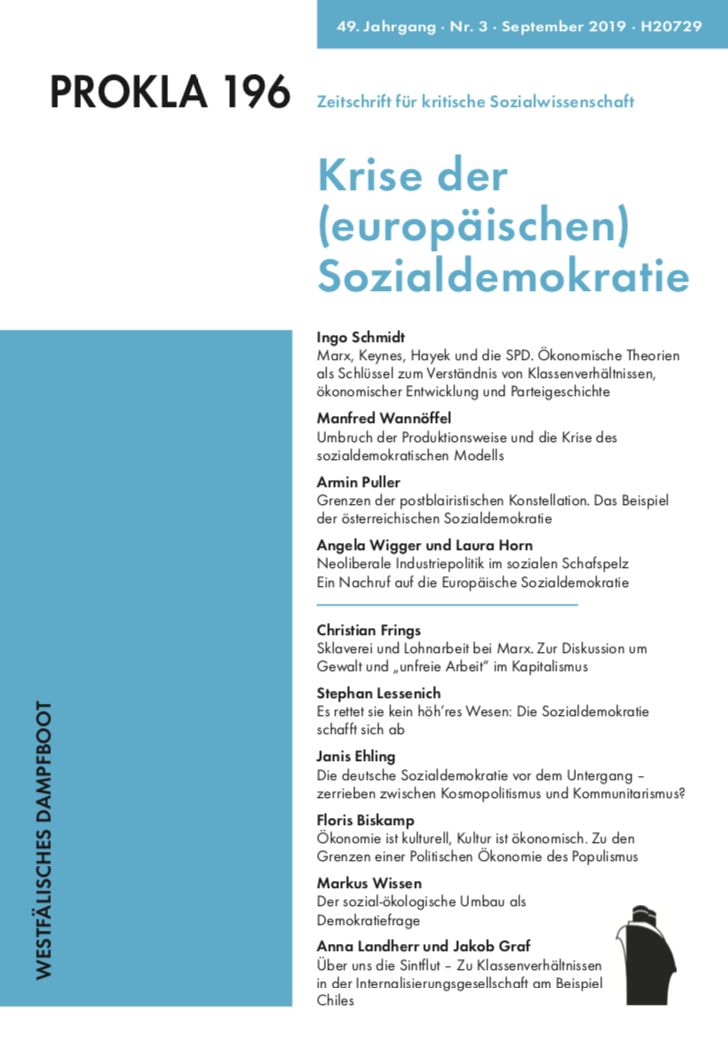German Social Democracy on the brink of collapse - torn between cosmopolitanism and communitarianism?
DOI:
https://doi.org/10.32387/prokla.v49i196.1830Keywords:
social democracy, SPD, party systemAbstract
The development of social democracy is not new, but its significance for society as a whole means that it is currently being rediscovered by the public. But the discussion remains superficial. A party - in the Gramscian sense as a social group - only disappears when the conflict from which the party emerged has been resolved. Accordingly, the organizations and traditions of the German parties date back 150 years - a remarkable constancy. And the central social lines of conflict have not changed significantly. Despite the claim of mainstream sociology that individualization is the cause of the decline of social democracy.
Downloads
References
Arzheimer, Kai (2013): Working-class parties 2.0? Competition between centre left and extreme right parties. In: Rydgren, Jens (Hg.): Class politics and the radical right. London: 75-90.
Balhorn, Loren (2019): Social Democracy at Death’s Door. In: Jacobine. URL: https://jacobinmag.com/2019/06/german-social-democrats-european-elections, Zugriff: 2.6.2019.
Bartolini, Stefano (2000): Political Mobilization of the left 1860-1980. The class cleavage. Cambridge. https://doi.org/10.1017/CBO9780511521560
Ders./Mair, Peter (2007): Identity, competition and electoral availability. The stabilization of European electorates 1885-1985. Colchester.
Deppe, Frank (2013): Autoritärer Kapitalismus. Demokratie auf dem Prüfstand. Hamburg.
Forschungsgruppe Wahlen (2009): Bundestagswahl 2009. Eine Analyse der Wahl von 27. September 2009. Mannheim.
Gagné, Jérémie/Hilmer, Richard (2019): Wo genau ist Mitte-Links? Wert- und Policy-Profile sozialdemokratischer Parteien in Europa – aus Sicht der nationalen Wahlbevölkerungen (value gaps / policy gaps). URL: https://www.fes.de/internationale-politikanalyse/artikelseite-ipa/wo-genau-ist-mitte-links, Zugriff: 1.7.2019.
Hirsch, Joachim/ Esser, Josef (1984): Der CDU-Staat: ein politisches Regierungsmodell für den nachfordistischen Kapitalismus. In: PROKLA 14(56): 51-66. https://doi.org/10.32387/prokla.v14i56.1438
Jun, Uwe (2012): Die sozialdemokratische Parteienfamilie. In: Jun, Uwe/ Höhne, Benjamin (Hg.): Parteienfamilien. Identitätsbestimmend oder Etikett? Opladen: 36-51.
Kirchheimer, Otto (1965): Der Weg zur Allerweltspartei. In: Lenk, Kurt/Neumann, Franz (1968): Theorie und Soziologie der politischen Parteien. Neuwied: 345-367.
Kitschelt, Herbert (2013): Social class and the radical right. Conceptualizing party preference formation and partisan choice. In: Rydgren, Jens (Hg): Class politics and the radical right. London: 224-251.
Klein, Markus u.a. (2019): Die Sozialstruktur der deutschen Parteimitgliedschaften. Empirische Befunde der Deutschen Parteimitgliederstudien 1998, 2009 und 2017. In: Zeitschrift für Parlamentsfragen 50(1): 81-98. https://doi.org/10.5771/0340-1758-2019-1-81
Lösche, Peter/Walter, Franz (1992): Die SPD. Klassenpartei – Volkspartei - Quotenpartei. Zur Entwicklung der Sozialdemokratie von Weimar bis zur deutschen Wiedervereinigung. Darmstadt.
Mair, Peter (2003): Political Parties and democracy: What sort of future? In: Central European Political Review (4): 6-20.
Merkel, Wolfgang (2018): SPD muss Anspruch der Volkspartei aufgeben. URL: https://www.tagesspiegel.de/politik/wolfgang-merkel-spd-muss-anspruch-der-volkspartei-aufgeben/22734200.html, Zugriff: 2.7.2019.
Ders. u.a. (2019): The Struggle Over Borders. Cosmopolitanism and Communtarianism. Cambridge.
Nachtwey, Oliver (2009): Marktsozialdemokratie. Die Transformation von SPD und Labour Party. Wiesbaden. https://doi.org/10.1007/978-3-531-91616-3
Nölke, Andreas (2017): Linkspopulär. Vorwärts handeln statt rückwärts denken. Frankfurt/M.
Oesch, Daniel (2013): The class basis between the new left and the radical right: an analysis for Austria, Denmark, Norway and Switzerland. In: Rydgren, Jens (Hg.): Class politics and the radical right. London: 31-52.
Offe, Claus (1980): Konkurrenzpartei und kollektive politische Identität. In: Roth, Roland (Hg.): Parlamentarisches Ritual und politische Alternativen. Frankfurt/M.–New York: 26-42.
PROKLA Redaktion (2018): Editorial: Autoritärer Populismus Strategie und politische Ökonomie rechter Politik. In: PROKLA. 48(190): 2-8. https://doi.org/10.32387/prokla.v48i190.28
Raphael, Lutz (2019: Jenseits von Kohle und Stahl. Eine Gesellschaftsgeschichte Westeuropas nach dem Boom. Frankfurt/M.
Reckwitz, Andreas (2017): Die Gesellschaft der Singularitäten. Zum Strukturwandel der Moderne. Frankfurt/M.
Rehage, Ruben (2018): Warum der Untergang der SPD nicht aufzuhalten ist. URL: https://www.stern.de/politik/deutschland/spd--warum-der-untergang-der-sozialdemokraten-nicht-aufzuhalten-ist-8414982.html, Zugriff: 27.6.2019.
Ritsert, Jürgen (1998) Soziale Klassen. Münster.
Rhodes, Martin (2015): Labour Markets, welfare states, and the dilemmas of European social democracy. In: Keating, Michael/McCrone, David (Hg.: The crisis of social democracy in Europe. Edinburgh: 140-155.
Sablowski, Thomas/ Thien, Günter (2018): Die Arbeiterklasse und die Linke – kein Problem? In: PROKLA 48(190): 55-72 https://doi.org/10.32387/prokla.v48i190.32
Seibert, Thomas (2016): Die Arbeiterklasse wird’s nicht tun. URL: https://www.neues-deutschland.de/artikel/1034515.rot-rot-gruen-die-arbeiterklasse-wird-s-nicht-tun.html, Zugriff: 4.7.2019.
Spier, Tim (2011): Wie aktiv sind die Mitglieder von Parteien. In: von Alemann, Ulrich (Hg.): Parteimitglieder in Deutschland. Wiesbaden: 97-119. https://doi.org/10.1007/978-3-531-92900-2_7
Stegemann, Bernd (2018): Die Moralfalle. Für eine Befreiung linker Politik. Berlin.
Thien, Günter (2018): Die verlorene Klasse. ArbeiterInnen in Deutschland. Münster.
Vester, Michael (2019): Von Marx bis Bourdieu. Klassentheorie als Theorie der Praxis. In: Klassen – Fraktion – Milieus. Beträge zur Klassenanalyse (1). Rosa Luxemburg Stiftung. Manuskripte 22. Berlin: 9-67.
von Beyme, Klaus (2000a): Parteien im Wandel. Von den Volksparteien zu den professionalisierten Wählerparteien. Wiesbaden. https://doi.org/10.1007/978-3-322-90730-1
Ders. (2000b): Funktionenwandel der Parteien in der Entwicklung von der Massenmitgliederpartei zur Partei der Berufspolitiker. In: Niedermayer, Oskar u.a. (Hg.): Parteiendemokratie in Deutschland. Wiesbaden: 315-340.
Walter, Franz (2010): Vom Milieu zum Parteienstaat. Lebenswelten, Leitfiguren und Politik im historischen Wandel. Wiesbaden. https://doi.org/10.1007/978-3-531-92213-3
Ders./ Micus, Matthias (2011): Wieder zurück? Die SPD als Volkspartei. In: Zeitschrift für Staats- und Europawissenschaften 9(3): 383-409. https://www.doi.org/10.5771/1610-7780-2011-3-383






